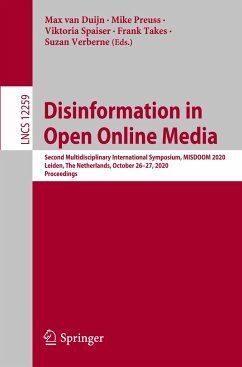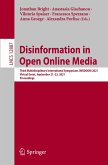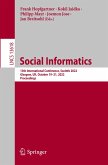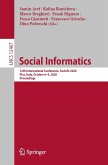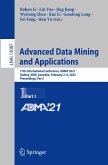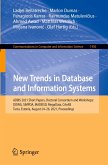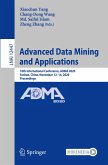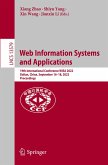Disinformation in Open Online Media
Second Multidisciplinary International Symposium, MISDOOM 2020, Leiden, The Netherlands, October 26-27, 2020, Proceedings
Herausgegeben:van Duijn, Max; Preuß, Mike; Spaiser, Viktoria; Takes, Frank; Verberne, Suzan
Disinformation in Open Online Media
Second Multidisciplinary International Symposium, MISDOOM 2020, Leiden, The Netherlands, October 26-27, 2020, Proceedings
Herausgegeben:van Duijn, Max; Preuß, Mike; Spaiser, Viktoria; Takes, Frank; Verberne, Suzan
- Broschiertes Buch
- Merkliste
- Auf die Merkliste
- Bewerten Bewerten
- Teilen
- Produkt teilen
- Produkterinnerung
- Produkterinnerung
Chapters "Identifying Political Sentiments on YouTube: A Systematic Comparison regarding the Accuracy of Recurrent Neural Network and Machine Learning Models", "Do Online Trolling Strategies Differ in Political and Interest Forums: Early Results" and "Students Assessing Digital News and Misinformation" are available open access under a Creative Commons Attribution 4.0 International License via link.springer.com.
Andere Kunden interessierten sich auch für
![Disinformation in Open Online Media Disinformation in Open Online Media]() Disinformation in Open Online Media38,99 €
Disinformation in Open Online Media38,99 €![Social Informatics Social Informatics]() Social Informatics38,99 €
Social Informatics38,99 €![Social Informatics Social Informatics]() Social Informatics65,99 €
Social Informatics65,99 €![Advanced Data Mining and Applications Advanced Data Mining and Applications]() Advanced Data Mining and Applications61,99 €
Advanced Data Mining and Applications61,99 €![New Trends in Database and Information Systems New Trends in Database and Information Systems]() New Trends in Database and Information Systems53,99 €
New Trends in Database and Information Systems53,99 €![Advanced Data Mining and Applications Advanced Data Mining and Applications]() Advanced Data Mining and Applications76,99 €
Advanced Data Mining and Applications76,99 €![Web Information Systems and Applications Web Information Systems and Applications]() Web Information Systems and Applications83,99 €
Web Information Systems and Applications83,99 €-
-
-
Chapters "Identifying Political Sentiments on YouTube: A Systematic Comparison regarding the Accuracy of Recurrent Neural Network and Machine Learning Models", "Do Online Trolling Strategies Differ in Political and Interest Forums: Early Results" and "Students Assessing Digital News and Misinformation" are available open access under a Creative Commons Attribution 4.0 International License via link.springer.com.
Produktdetails
- Produktdetails
- Lecture Notes in Computer Science 12259
- Verlag: Springer / Springer International Publishing / Springer, Berlin
- Artikelnr. des Verlages: 978-3-030-61840-7
- 1st ed. 2020
- Seitenzahl: 292
- Erscheinungstermin: 21. Oktober 2020
- Englisch
- Abmessung: 235mm x 155mm x 16mm
- Gewicht: 446g
- ISBN-13: 9783030618407
- ISBN-10: 3030618404
- Artikelnr.: 60126797
- Herstellerkennzeichnung
- Springer-Verlag KG
- Sachsenplatz 4-6
- 1201 Wien, AT
- ProductSafety@springernature.com
- Lecture Notes in Computer Science 12259
- Verlag: Springer / Springer International Publishing / Springer, Berlin
- Artikelnr. des Verlages: 978-3-030-61840-7
- 1st ed. 2020
- Seitenzahl: 292
- Erscheinungstermin: 21. Oktober 2020
- Englisch
- Abmessung: 235mm x 155mm x 16mm
- Gewicht: 446g
- ISBN-13: 9783030618407
- ISBN-10: 3030618404
- Artikelnr.: 60126797
- Herstellerkennzeichnung
- Springer-Verlag KG
- Sachsenplatz 4-6
- 1201 Wien, AT
- ProductSafety@springernature.com
Checkworthiness in Automatic Claim Detection Models: Definitions and Analysis of Datasets.- How Fake News Affect Trust in the Output of a Machine Learning System for News Curation.- A Dip Into a Deep Well: Online Political Advertisements, Valence, and European Electoral Campaigning.- Misinformation from Chinese Web-based Newspapers? Machine Computational Analysis of Metabolic Disease Burden.- Students Assessing Digital News and Misinformation.- Defend Your Enemy. A Qualitative Study on Defending Political Opponents Against Hate Speech Online.- Automatically Identifying Political Ads on Facebook: Towards Understanding of Manipulation via User Targeting.- Identifying Political Sentiments on YouTube: A Systematic Comparison regarding the Accuracy of Recurrent Neural Network and Machine Learning Models.- Abusive Comments in Online Media and How to Fight Them: State of the Domain and a Call to Action.- Fake News Detection on Twitter Using Propagation Structures.- #ArsonEmergency and Australia's "Black Summer": Polarisation and Misinformation on Social Media.- How Identity and Uncertainty Affect Online Social Influence: An Agent-Based Approach.- Do Online Trolling Strategies Differ in Political and Interest Forums: Early Results.- On the Robustness of Rating Aggregators Against Injection Attacks.- FakeYou! - A Gamified Approach for Building and Evaluating Resilience Against Fake News.- Combating Disinformation: Effects of Timing and Correction Format on Factual Knowledge and Personal Beliefs.- Near Real-Time Detection of Misinformation on Online Social Networks.- Multi-modal Analysis of Misleading Political News.
Checkworthiness in Automatic Claim Detection Models: Definitions and Analysis of Datasets.- How Fake News Affect Trust in the Output of a Machine Learning System for News Curation.- A Dip Into a Deep Well: Online Political Advertisements, Valence, and European Electoral Campaigning.- Misinformation from Chinese Web-based Newspapers? Machine Computational Analysis of Metabolic Disease Burden.- Students Assessing Digital News and Misinformation.- Defend Your Enemy. A Qualitative Study on Defending Political Opponents Against Hate Speech Online.- Automatically Identifying Political Ads on Facebook: Towards Understanding of Manipulation via User Targeting.- Identifying Political Sentiments on YouTube: A Systematic Comparison regarding the Accuracy of Recurrent Neural Network and Machine Learning Models.- Abusive Comments in Online Media and How to Fight Them: State of the Domain and a Call to Action.- Fake News Detection on Twitter Using Propagation Structures.- #ArsonEmergency and Australia's "Black Summer": Polarisation and Misinformation on Social Media.- How Identity and Uncertainty Affect Online Social Influence: An Agent-Based Approach.- Do Online Trolling Strategies Differ in Political and Interest Forums: Early Results.- On the Robustness of Rating Aggregators Against Injection Attacks.- FakeYou! - A Gamified Approach for Building and Evaluating Resilience Against Fake News.- Combating Disinformation: Effects of Timing and Correction Format on Factual Knowledge and Personal Beliefs.- Near Real-Time Detection of Misinformation on Online Social Networks.- Multi-modal Analysis of Misleading Political News.

